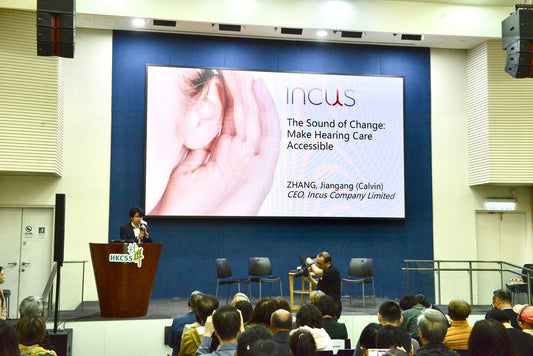You have probably heard of hearing loss, which is when sounds do not feel loud enough for someone with reduced hearing sensitivity to hear clearly. But have you heard about hyperacusis? Hyperacusis is a form of hypersensitivity to sound, where sounds tolerated by others are perceived as annoying or even unbearable to those with hyperacusis. This condition is quite rare, yet has several causes. If left untreated, it can cause other hearing problems. In this article, we will introduce hyperacusis and its causes, as well as its symptoms.
What Is Hyperacusis?
Hyperacusis is a disorder where our ears have increased sensitivity to loud sounds, so they are often perceived as stronger than usual. The result is a lower tolerance for sounds. The sounds triggering negative reactions can be something as common as environmental or background sounds like traffic or human voices.
In most situations, people with healthy hearing do not usually perceive unimportant sounds like air-conditioning and footsteps. However, to a hyperacusis patient, these sounds are much louder, and can even be painful to hear. The situation becomes worse when the patient perceives sudden and high-pitched sounds such as screeches, airhorn sounds, or even their own voice.
The constant pain and stress due to hyperacusis can cause a handful of other problems. Because of the irritating environmental noise, patients may avoid conversation, causing isolation and social withdrawal. If the disorder deteriorates, the patient might even develop phonophobia, a fear of sound.
Now that we have a good understanding of hyperacusis, let’s move on to the causes of hyperacusis.
Causes of Hyperacusis
There are many causes of hyperacusis, including:
- loud noise exposure
- head injury
- drugs and medicines
- temporomandibular joint disorder
- ear infections
- surgery around your head
- emotional stress or depression
- aging
If you have experience with the above causes, you might want to check and see if you have the symptoms of hyperacusis.
Signs and Symptoms of Hyperacusis
Here are the signs and symptoms of hyperacusis:
- own voice is too loud
- some sounds (e.g. engine sounds, air conditioning sounds) are louder than usual
- headache
- unable to concentrate
- painful when hearing sounds
- anxiety and depression
- social withdrawal
- poor sleep quality
All the above signs and symptoms contribute to hyperacusis. If you are experiencing one or more of the above symptoms, you should consult audiologists or doctors as soon as possible.
Hyperacusis can also be associated with other hearing health conditions. One of the associations is with hearing loss, which brings even more inconvenience and problems for hearing loss patients.
Hyperacusis Among Hearing Loss Patients
A person can have both hyperacusis and hearing loss at the same time.
Hearing loss is usually treated with hearing aids, which make sounds louder. So what happens if a patient also has hyperacusis?
It’s quite complicated. You want to be able to hear soft sounds like a soft voice or environmental noise with the amplification of the hearing aid, but at the same time, you don’t want it to amplify loud noise because you are sensitive to loud noise due to hyperacusis.
Those patients should seek help from audiologists to tune their hearing aids. Even though hearing aids can be customized, audiologists can make sure that the ranges of sounds amplified are the best fit for them.
To do this, they will carefully locate the patient’s Uncomfortable Loudness Level (UCL), which is the point where sounds are too loud. They may also take the Most Comfortable Loudness (MCL) into account.
The range between the hearing threshold (the lower barrier for perceiving speech) and the UCL can be very narrow for those with hyperacusis.
However, in daily life and communication, the fluctuations in volume carry important information helping us perceive the world. With a narrow range for sound to fluctuate within, some information is lost, and it is challenging to fit hearing aids well to this problem.
Conclusion
Knowing how many negative impacts hyperacusis brings, we should always pay attention to our hearing conditions, and seek help from professionals upon noticing abnormalities in sounds for an early diagnosis and treatment.



